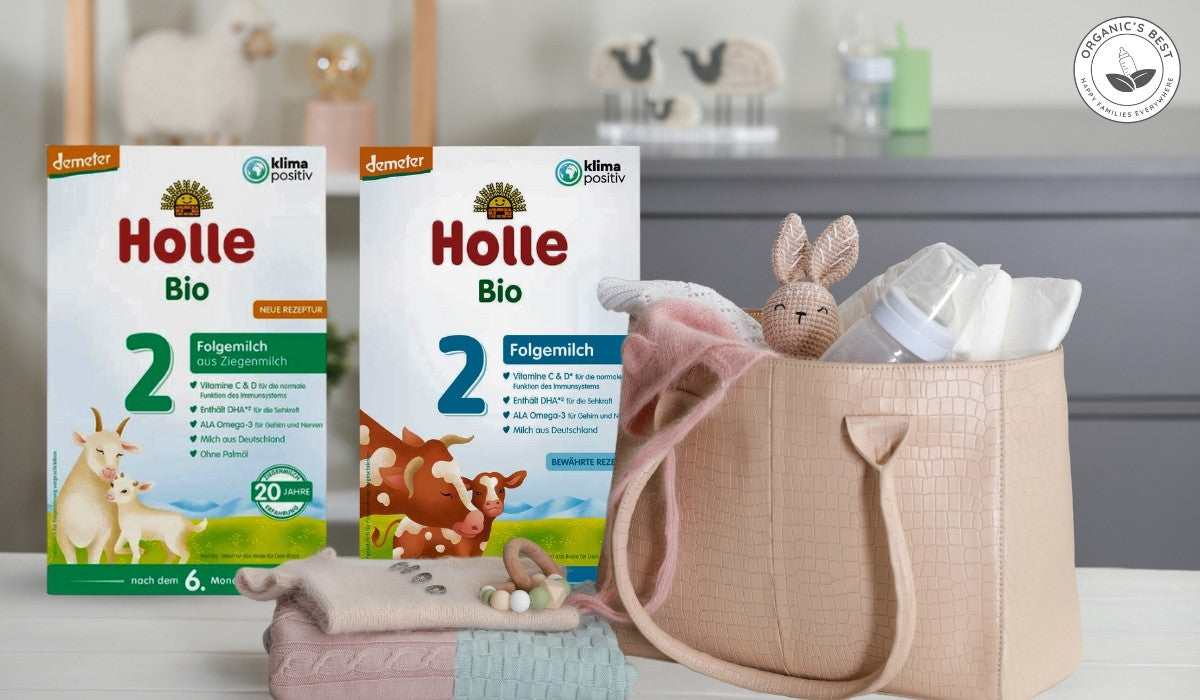Click to Get 2 FREE Boxes/Cans
Only New Customers! Click HERE to Get 2 Extra Boxes/Cans for Free With Your First Order.
BABY FORMULA
Offering new parents top-quality European infant formula from renowned brands like HiPP, Holle, Kendamil, and more. If you’re uncertain about which product to choose, our Formula Finder can help you make the best decision for your baby.
Baby Food
Offering new parents a premium selection of European baby foods, including jars, pouches, cereals, and snacks from esteemed brands like HiPP and Holle.
Holle Cow vs Goat Formula Comparison
by Agustina Fernandez November 13, 2023 7 min read

In nourishing our little ones, every choice we make becomes crucial for their growth and well-being. Holle stands as a beacon of excellence in this journey, with its unwavering commitment to crafting organic, premium infant formulas.
Among the myriad considerations in this world of infant nutrition, many parents find themselves weighing the merits of cow milk formula against goat milk formula. Naturally, the pressing question arises: Is goat formula better than cow formula?
Throughout the course of this article, we will navigate the intricacies of Holle goat milk vs cow milk formula. We'll explore the nuances of their ingredients, potential benefits, and any considerations about Holle organic formula that may influence your choice!
Table of contents
Holle Cow Milk Formula: The Go-To Breast Milk Substitute 🐄
Let's start with arguably the most well-known of all, Holle's organic infant formula, the classic cow milk formula.
Core Ingredients 🍼: Holle's cow milk formulas boast a straightforward yet nutritionally rich composition. This baby formula is crafted from carefully selected ingredients, including skimmed cow milk, whey, complementary carbohydrates, vegetable oils, and essential fatty acids docosahexaenoic acid (DHA) and alpha-linolenic acid (ALA).
What Holle Formula Leaves Out ❌: In their baby formulas, you won't find any artificial sweeteners, flavors, colouring agents, or genetically modified organisms (GMOs).
Unique Benefits of Holle Cow ✨: Holle's cow milk formula stands out for several reasons. Firstly, the recipes are kept simple, allowing the natural goodness of the ingredients to shine through. Additionally, Holle sources ingredients of Demeter quality, which signifies a biodynamic agricultural standard that goes beyond organic farming. Moreover, the milk used in Holle's cow formula is processed gently to preserve its nutritional integrity and more closely mimic breast milk.
Organic Certifications 🌿: Holle's cow formula holds the rigorous EU organic certification. Furthermore, their cow milk formula (except stage 4) is Demeter-certified, which represents an even higher level of organic and biodynamic quality.
Variety and Stages 🔢: Holle caters to the diverse needs of growing infants by offering a range of stages within their cow milk formula line:
-
Holle Cow Stage PRE (0 to 6 months)
-
Holle Cow Stage 1 (0 to 6 months)
-
Holle Cow Stage 2 (6+ months)
-
Holle Cow Stage 3 (10+ months)
-
Holle Cow Stage 4 (12+ months)
A2 Cow Milk: A Gentler Alternative 🅰️2️⃣🐮
Holle A2 cow milk formula offers a gentler alternative to standard cow milk-based products, and in this section, we'll explore the unique benefits it brings to the table!
But first, let's examine what exactly A2 cow milk formula is by outlining the fundamental difference between A1 and A2 cow milk proteins. Originally, all cows produced only the A2 protein type. However, due to genetic mutations, dairy cows began producing the A1 β-casein protein.
A2 milk is gentler for your baby's digestive system than standard cow milk, making it a great alternative for sensitive little ones! While A2 may reduce certain digestive discomforts for some, it is not a suitable replacement for babies with confirmed CMPA.
Core Ingredients 🍼: Holle's A2 cow milk formula features a carefully selected blend of skimmed A2 milk proteins, whey, complementary carbohydrates provide energy, vegetable oils contribute important fatty acids, and DHA and ALA support healthy brain and eye development in growing infants.
What Holle Leaves Out ❌: Staying true to its commitment to purity and quality, Holle's A2 cow milk formula excludes artificial sweeteners, flavors, coloring agents, and GMOs.
Unique Benefits of Holle Cow A2 ✨: A2 cow milk formula stands as an excellent choice for babies with sensitive digestive systems. It offers a compelling alternative to standard cow's milk-based products, as many babies may find it easier to tolerate.
Organic Certifications 🌿: Holle's A2 cow milk formula proudly carries the EU organic certification, adhering to the stringent standards that ensure the highest quality and purity in their products.
Variety and Stages 🔢: Holle offers their A2 milk formula in a variety of stages made to accommodate the changes in dietary requirements as your baby grows:
-
Holle A2 Formula Stage 1 (0 to 6 months)
-
Holle A2 Formula Stage 2 (6+ months)
-
Holle A2 Formula Stage 3 (10+ months)
Holle Goat Formula: Easily Digested and Delicious
As we continue our exploration of Holle's offerings in the realm of infant nutrition, our focus now turns to their goat milk formula.
Core Ingredients 🍼: What makes Holle's goat milk formulas truly exceptional is the use of whole goat milk as the primary ingredient and source of fat. This choice imparts a naturally creamy taste and a lower vegetable oil content, ensuring a wholesome and rich source of nutrition for your child! Additionally, Holle goat milk formula contains DHA sourced from algae, ALA, lactose, and vegetable oils.
What Holle Leaves Out ❌: You won't find any artificial sweeteners like corn syrup, flavors, coloring agents, or GMOs in their organic goat milk formula. Notably, Holle goat milk formula does not include palm or fish oil for the most natural and wholesome nutrition.
Unique Benefits of Holle Goat ✨: Holle goat milk formula naturally contains a high content of palmitic acid, which is vital for babies as it supports energy production and the development of their brain and nervous system. This eliminates the need for added palm oil to the baby formula. Moreover, this formula contains A2 goat milk protein, which, along with the milk's short and medium-chain fatty acids, ensures superior digestibility and nutrient absorption.
Organic Certifications 🌿: Holle's goat milk formula holds the EU organic certification. Furthermore, their goat milk formula (except stage 4) is Demeter-certified; notably, Holle produces the only baby formula made from Demeter-quality goat milk!
Variety and Stages 🔢: Holle offers a range of stages within their goat milk line, each thoughtfully tailored to meet the evolving needs of infants and toddlers:
-
Holle Goat Milk Stage PRE (0 to 6 months)
-
Holle Goat Milk Stage 1 (0 to 6 months)
-
Holle Goat Milk Stage 2 (6+ months)
-
Holle Goat Milk Stage 3 (10+ months)
-
Holle Goat Milk Stage 4 (12+ months)
Direct Comparison: Holle Goat Milk vs. Cow Milk Formula
Having explored the rich essence of Holle's goat and cow milk formulas, let's dive into an exciting head-to-head comparison of the two!
1) Taste and Texture
Both A1 and A2, cow milk formulas, are known for their consistent taste, while goat's milk is described as being milder and sweeter compared to cow's milk. Furthermore, Holle goat milk formula naturally possesses a creamier texture due to the base of whole milk.
2) Nutritional Differences
By law, goat milk and cow baby formula must contain the essential nutrients necessary for your baby's growth and development. Consequently, there are no significant nutritional differences between goat vs cow milk formula.
3) Digestibility
The protein composition of Holle goat milk formula makes it easier and more efficient to digest than cow milk. This attribute often makes goat's milk formula a preferred choice for infants with sensitive digestive systems.
4) Allergenicity
Both cow and goat milk formulas share similar protein compositions and contain lactose, making them unsuitable for babies with lactose intolerance or a cow's milk protein allergy (CMPA), as it could potentially lead to an allergic reaction.
Making the Right Choice for Your Baby: Goat Formula vs Cow Formula
Every child is unique, and so are their nutritional requirements. Before selecting a formula, assess your baby's specific needs. Consider any allergies or intolerances they may have, as well as their digestion.
If your baby has CMPA or lactose intolerance, for example, you may need to explore alternative options. On the other hand, some infants may have sensitive digestive systems that could benefit from a formula like Holle's A2 or goat milk formula, which are known for their greater ease of digestibility.
Remember that your baby's pediatrician is an invaluable resource in this decision-making process. They have a deep understanding of your child's medical history and can provide expert guidance on the most suitable formula for their needs.
Holle Infant Formula FAQs
Now it's time to answer some of your most asked questions regarding goat and cow milk infant formula!
Is Goat Milk Formula Better than Cow Milk?
Neither one is universally "better" than the other. Holle goat milk formula offers potential digestibility advantages and a pleasant creamy taste, while Holle cow milk formula is a reliable option for many infants.
What Are the Benefits of Holle Goat Milk Formula?
Holle goat milk formula offers several advantages, including its creamy texture, natural sweetness, and the presence of A2 protein, which is easier for some babies to digest. It's also made from Demeter-certified goat's milk, emphasizing biodynamic and organic farming practices.
Is Goat's Milk Easier to Digest for Babies?
Goat milk is often considered more digestible than cow's milk for some babies. However, individual tolerance can vary, and it's important to monitor your baby's reaction to any formula and consult with a pediatrician if you have concerns about digestion. Plus, as we discussed, it's not suitable for babies with CMPA or lactose intolerance.
Why is Goat's Milk Preferred Over Cow's Milk?
Goat's milk is a newer milk formula option offering some potential digestibility advantages over cow milk. The protein structure in goat milk formula vs cow milk formula is closer to that of human breast milk, and it contains A2 protein, which some infants find easier to digest.
Conclusion: Goat vs Cow Formula
Every baby has distinct nutritional requirements based on the presence or lack of allergies and digestive sensitivities. Therefore, when choosing Holle goat milk vs. cow milk baby formula, it's essential to make an informed decision based on their specific needs. We strongly encourage parents to stay informed, consult with pediatricians or healthcare professionals, and trust their instincts. Ultimately, your baby's health and happiness are at the heart of this decision.
Disclaimer:
Please be aware that this information is based on general trends in babies, and it is not medical advice. Your doctor should be your first source of information and advice when considering any changes to your child’s formula and when choosing your child’s formula. Always consult your pediatrician before making any decisions about your child’s diet or if you notice any changes in your child. Breastfeeding is the best nutrition for your baby because breast milk provides your child with all the essential nutrients they need for growth and development. Please consult your pediatrician if your child requires supplemental feeding. |
Agustina Fernandez
Dr. Agustina Fernandez earned her medical degree from the prestigious Universidad Nacional de Córdoba, Argentina. With a deep-rooted passion for pediatrics, Dr. Fernandez is currently on the path to specializing in children's healthcare. Recently, she has delved into the vital field of infant nutrition. Her research interests include breastfeeding, infant formula, and baby food in little ones’ formative years. Dr. Fernandez's commitment to this area of study underscores her dedication to ensuring the health and well-being of children from their earliest days.
Leave a comment
Comments will be approved before showing up.
Also in Organic Infant Nutrition and Health Blog

Spilled Milk: Feeding Unfiltered with Hayley
by Agustina Fernandez February 04, 2026 4 min read
Read More
Baby Bath Guide: How to Bathe a Newborn
by Agustina Fernandez February 03, 2026 8 min read
Read More
Does Your Kid Need More Vitamin D in Winter?
by Agustina Fernandez January 28, 2026 7 min read
Read More
Reviewed by Dr. Bardha Qerimi, MD
-

Dr. Bardha Qerimi: Medical Reviewer of Organic's Best Blog
Dr. Bardha Qerimi completed her medical studies at the University of Prishtina in Kosovo, where she began her journey into the field of medicine. She has since developed a career in medical research, contributing to projects with notable organizations, including the World Health Organization (WHO).
